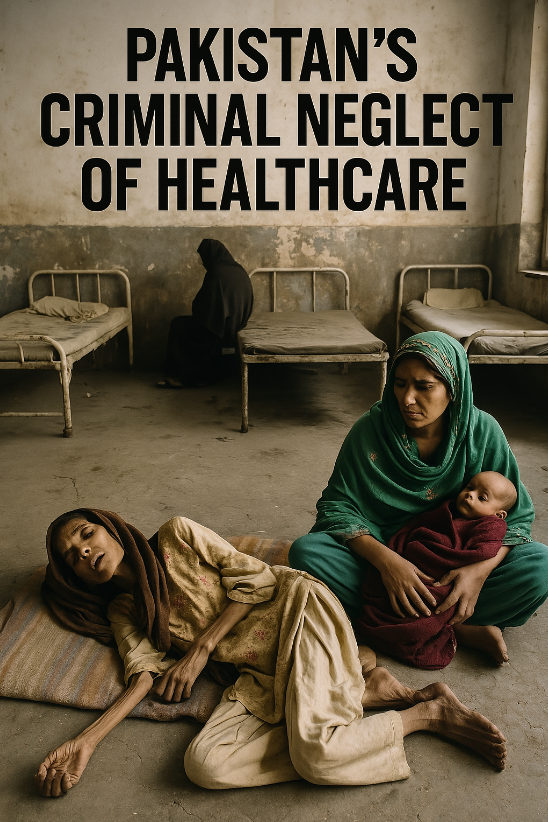Pakistan Criminal Neglect of Healthcare

Pakistan stands at the precipice of a humanitarian disaster of its own making. While government officials proudly tout billion-dollar defense acquisitions and nuclear capabilities, millions of citizens continue to suffer and die from entirely preventable causes in a healthcare system that can only be described as catastrophic. This isn’t mere incompetence but it’s criminal negligence.The statistics tell a scary story. Pakistan allocates a paltry 0.4% of its GDP to healthcare, a shocking figure that falls dramatically short of the 6% recommended by the World Health Organization for low-income countries. This isn’t simply “underfunding”; it’s deliberate starvation of a vital sector. While fighter jets worth billions gleam in military parades, patients lie two to a bed in hospitals where basic supplies like clean syringes are luxuries.
Public hospitals across the country have become monuments to state failure. Nearly 60% lack essential medical equipment according to the Pakistan Medical Association. Outdated infrastructure, overcrowded wards, and chronic shortages of supplies have created conditions more reminiscent of medieval plague houses than modern medical facilities. Patients don’t just struggle to recover in these institutions, they fight to survive them. The shortage of healthcare professionals further exacerbates this crisis. Reports indicate Pakistan needs at least 30,000 more doctors just to provide basic care. Not for lack of talented, dedicated individuals, but because of a system that offers neither adequate training opportunities nor reasonable compensation. Medical professionals flee to other countries where their skills are valued, while rural regions remain desperately underserved.
Pakistan’s priorities could not be clearer. The country maintains one of the largest standing armies in the world, complete with a nuclear arsenal that costs billions to maintain. The annual defense budget dwarfs healthcare spending by orders of magnitude. Fighter aircraft, tanks, and submarines take precedence over dialysis machines, ambulances, and hospital beds. This perverse allocation of resources isn’t accidental, it’s ideological. The state has consistently chosen military power over citizen welfare, convinced that external security matters more than internal wellbeing. The argument that Pakistan faces existential threats requiring massive defense spending rings hollow when its own citizens are dying by the thousands from treatable conditions. A state that cannot provide basic healthcare to its population has fundamentally failed, regardless of how impressive its military parades might be.
The crisis extends beyond chronic underfunding into the realm of outright criminality. The Nishtar Hospital scandal represents the horrifying reality of Pakistan’s healthcare system. In this south Punjab facility, supposedly the region’s premier public hospital, patients contracted HIV during routine dialysis procedures due to egregious negligence. One patient died; thirty others now live with a life-altering virus contracted in the very place meant to heal them. This wasn’t an isolated incident. The same hospital made headlines when four decomposing corpses were discovered on its roof, a macabre discovery that defies comprehension in a functioning medical institution. These aren’t mere “lapses” or “oversights” ; they represent complete systemic collapse.
Pakistan now holds the dubious distinction of ranking second among nations with the sharpest rise in HIV cases in the Asia-Pacific region. Behind this statistic lie thousands of personal tragedies: infected blood transfusions, reused syringes, and criminally negligent medical practices. The country’s medical structure, in the damning words of critics, more closely resembles “an abattoir” than a healthcare system.
The healthcare crisis is particularly acute in rural areas, where approximately 60% of Pakistan’s population resides. In these regions, healthcare facilities are either nonexistent or so woefully inadequate that they provide little more than symbolic service. Specialized care is virtually unavailable, forcing rural residents to travel hundreds of kilometers to urban centers—a journey many cannot afford and some don’t survive.
Villages lack basic primary care centers, let alone facilities equipped to handle emergencies or complex conditions. Maternal mortality rates in rural Pakistan remain among the highest in Asia, with women dying from complications that would be easily managed in functioning healthcare systems. Children die from diarrheal diseases, respiratory infections, and other preventable conditions while the state invests in yet another weapons system.
Access to essential medicines represents another facet of this multilayered catastrophe. When medications are available at all, they’re often prohibitively expensive for the average Pakistani. The pharmaceutical sector operates with minimal oversight, leading to price gouging, counterfeit drugs, and quality control issues that further endanger patients. Low-cost generic medicines may occasionally reach government facilities, but critical, life-saving medications remain scarce. Families sell assets, incur crushing debt, or simply watch loved ones suffer when unable to afford treatment. All this occurs while billions flow freely into military coffers.
Pakistan stands at a crossroads. It can continue down its current path, prioritizing military might while its citizens suffer and die from preventable causes or it can fundamentally reorient its national priorities toward human security and wellbeing. The solution begins with dramatically increased healthcare funding, not incremental increases, but transformative investment. The 0.4% GDP allocation must rise significantly toward the WHO-recommended 6%. This isn’t charity; it’s the basic obligation of a functioning state to its citizens. Infrastructure development must focus on rural and underserved areas, not just prestigious facilities in major cities. The healthcare workforce requires expansion, better training, and incentives to serve where they’re most needed. Strong accountability mechanisms must ensure that medical negligence and malpractice face swift, severe consequences. Most importantly, Pakistan needs a fundamental philosophical shift away from its military-first mentality. True national security isn’t measured in warheads or fighter jets but in the health, wellbeing, and productivity of citizens. A country where patients share hospital beds and die from preventable diseases cannot claim to be secure, regardless of its arsenal.






